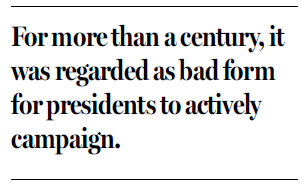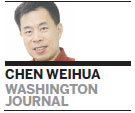
US President Barack Obama took to the campaign trail in Philadelphia on Tuesday to offer a helping hand to Hillary Clinton. The Democratic presidential nominee's health issues have made headlines since the past few days and triggered wild speculation across the United States and indeed the world after she left the 9/11 anniversary memorial service in New York on Sunday morning early with "overheating" as the reason.
In Philadelphia, Obama proclaimed his strong support for Clinton while fiercely blasting Republican presidential candidate Donald Trump.
While it is nothing new for a sitting US president to campaign for his party's nominee, as witnessed in the last 240 years of US history, it is a practice that does not resonate with a great democracy touted by US politicians like Obama.
Obama has famously said that "there is not a liberal America and a conservative America - there is the United States of America. There is not a black America and a white America and Latino America and Asian America - there's the United States of America."

But in campaigning for his party's candidate, he is doing so as the "Democratic president", a role he should not assume. He is the president of all Americans, Republicans, Democrats, Libertarians or Green Party alike. His salary, about $400,000 a year, is paid by US taxpayers, regardless of party affiliation.
According to USA Today White House correspondent David Jackson, for more than a century, it was regarded as bad form for presidents to actively campaign, even for their own elections. Lame duck presidents have been more active on the stump only in recent decades, to the degree that they are welcome by the nominee. Jackson predicted in June that Obama will become the most active lame duck campaigner in history.
By spending time on the campaign trail, the US president is taking away time that should be spent on issues of concern to all Americans, not just his own party's voters. It is not hard to name a few of the top issues - jobs, crime, immigration, a deteriorating infrastructure, the gap between the rich and poor.
It would be easy for Americans to dismiss the views of a Chinese on their political system, as I encounter often over the years. But a system that is truly great should consider views not just of its own citizens, but of people from around the world.
In China, there is a saying: "I can't tell the true shape of Mount Lushan simply because I myself am in the mountain." It means that only people looking from the outside can see the picture clearly.

My views about how to improve the US presidential election system certainly are not limited to this. The campaign finance system is deeply flawed because much of the money has been spent on negative campaign ads that are personal attacks or endorsements.
The facts are often distorted. And this is especially true for those negative ads run by so-called super PACs - political action committees that pool campaign contributions and donate the funds to rally for or against candidates.
There should clearly be a limit on the amount of such funds if Americans want to get rid of the "money in politics", as Obama himself has complained.
Some campaign ads are so nasty that the whole presidential race no longer looks healthy. An ethical code is needed as to what should be allowed and forbidden in those campaign ads. There is no doubt that some candidates believe that a lie repeated often enough becomes truth, a quote from Nazi Germany's propaganda minister Joseph Goebbels.
These are some of the defects in the US presidential election system, and if fixed, they will make the US political system much more functional and attractive.
The author is deputy editor of China Daily USA. chenweihua@chinadailyusa.com